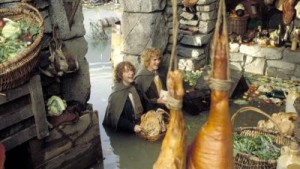
Are meals at your house a hasty and chaotic event? Do members of your family fight at the table? Have you ever made a meal and not been thanked for all the hard work you put into it?
If so, you and your family might want to take after the Shire-folk and break bread like a Hobbit.
Hobbits love to eat. But they especially love eating together. Meals for them are a pleasant, joyful time and they’re thankful for every meal they get, especially during those times of respite from the turmoil of their adventures.
When the Hobbits arrive at Tom Bombadil’s house after their harrowing time in the Old Forest, they’re welcomed inside and taken to a bedroom where they can wash up (just like little kids coming in from playing outside). Then they’re given a “long and merry” meal with Tom and his wife Goldberry, and are stuffed by the end of it (which is quite a difficult thing to do with a Hobbit).
When Frodo and his friends get to Bree after the terrors of the Barrow Downs and the threat of Ringwraiths on the road, they check into The Prancing Pony and are shown to a cozy little room with a cheerful fire burning on the hearth, and a table spread with a white cloth where they proceed to stuff themselves with cheese, cold meats, bread and soup. They feel “refreshed and encouraged” afterwards, which is how you should feel after a meal.
If anybody can tell me a work of fiction that mentions food and eating more than The Lord of the Rings (along with The Hobbit) please let me know. Food is, without question, one of the more important themes of Tolkien’s stories. We learn what Gandalf devours when he returns to Beorn’s house after a little jaunt (two loaves of bread smothered in butter, honey and clotted cream plus a quart of mead); what’s on the desert menu at The Prancing Pony (it’s blackberry tart); and the provisions Merry and Pippin manage to scrounge from Saruman’s storerooms (salted pork, rashers of bacon, bread with butter and honey, wine and beer).
Tolkien was, apparently, obsessed with food. He was orphaned at the age of twelve, and must have been deprived of many a home cooked meal. Then he had to live in the squalid trenches during WWI where men existed on a few ounces of stale (or rotten) food each day. By the time he was working on The Lord of the Rings, England was at war again and even tea, god forbid!, was rationed (Tolkien liked his tea with honey, by the way).
Hobbits are the original foodies. They are obsessed with mushrooms and the best beer (The Golden Perch, we are told, had a legendary ale). They make themselves sumptuous birthday party feasts, and going away part feasts, and probably even party planning feasts.
But they’ll take what they can get and they’re happy for it. They actually love the delicious and nutritious lembas, the Elven waybread given to them in Lothlórien (which is like the Middle-earth version of a Luna Bar). Merry and Pippin aren’t above scrounging through the flotsam and jetsam of Isengard for a meal (and a good smoke to boot). And Sam even brings along his own camp cooking gear including pans, a wooden spoon and a precious box of salt. He makes a stew of some rabbits (captured by Gollum) with some scrounged herbs thrown in, and this meager meal “seemed a feast.”
That’s because the Hobbits are grateful for whatever they can get, and even though they’re greedy by nature, they’re happy to share. They would never eat alone when they could eat together, talking merrily and enjoying one another’s company.
“Peaceful, Happy, Grateful.” That is what’s written in crayon over the entrance to our dining room. My son inscribed the words one day while I lifted him up so he could reach that high place. We’d decided, as a family, that those three words were really important to us when having a meal together. And we wanted to remember them every time we sat down.
Peaceful because life is hectic and meals should be a time to relax.
Happy because we’re all together.
Grateful because there are a lot of people in the world who don’t have enough to eat.
We try as best as we can to always eat as a family. And we make every meal that we’re lucky enough to share together something that nourishes our souls as well as our bodies.
